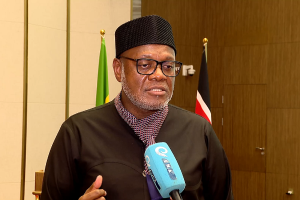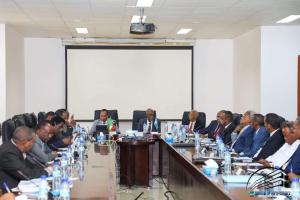Politics - ENA English
Politics
El Salvador to Open Diplomatic Mission in Addis
Apr 29, 2024 76
Addis Ababa, April 29/2024 (ENA) El Salvador plans to open a diplomatic mission in Addis Ababa, Ethiopia that will be its second embassy in Africa. A delegation led by El Salvador's Foreign Minister, Alexandra Hill Tinoco, met with Foreign Minister, Taye Atske Selassie, according to the Ministry of Foreign Affairs. In their discussion, the two ministers exchanged ideas on issues that would enable them to strengthen their bilateral relations and their cooperation in multilateral forums within the South-South framework. El Salvador has decided to open its second embassy in Africa, the country’s foreign minister said. FM Taye assured the minister that the Ethiopian government will fully support them in this regard. The two countries have agreed to further strengthen their cooperation in education, agriculture, sports and various other fields.
PM Abiy Arrives in Kenya to Attend IDP21 Replenishment Summit
Apr 29, 2024 167
Addis Ababa April 29/2024 (ENA) Prime Minister Abiy Ahmed and his delegation arrived in Nairobi, Kenya to participate in the International Development Association (IDA) 21 Replenishment Summit. The Summit seeks to emphasize to IDA donors and other partners the crucial priority areas for development financing in Africa, urging donors to strongly consider increasing funding for the IDA21 cycle, according to the Office of the Prime Minister. This support is essential to address Africa's development challenges and opportunities, as well as those faced by IDA countries in other regions, it was learned.
Ethiopians Voice Support for Successful Conduct of National Dialogue
Apr 28, 2024 483
Addis Ababa, April 28/2024 (ENA) Ethiopians across the country, interviewed by ENA, expressed strong support for the success of the National Dialogue Commission's efforts to bring lasting peace and unity. Ethiopians in different areas of the country acclaimed the inclusive and bottom up approaches of the commission during the public participations and selection of participants. The commission has finalized the selection of participants from 10 regions and 2 city administrations, including in Assosa, Dire Dawa, Adama, Hawasana and Wolayta Sodo. This inclusive process, ensuring broad representation, has been met with public enthusiasm, it was learned. Dereje Gutema, a resident of Dire Dawa, believes the commission's bottom-up approach during the selection increases its inclusiveness and credibility. Citizens are eager to contribute to the National Dialogue's success, he observed. Dereje stated, for the commission's mission to be successful, all citizens should do their part. Vice Chairman of the Adama City Council of Elders, Feysa Megersa, has also emphasized the importance of collective action. The commissions inclusive approach in the dialogues are crucial to resolve the issues. The National Dialogue Commission is seen as a crucial step towards lasting peace and development. Feysa stressed, "the contribution of the commission is crucial to create lasting peace and development by correcting the rift and failed processes inherited from history." Bruk Balcha, a resident of Wolaita Sodo, on her part said the National Dialogue Commission will play a significant role in maintaining the peace and unity of the country. Emphasizing the importance of inclusive dialogue to solve challenges, she stressed the need to use this opportunity to resolve the problems that have arisen in the past. These sentiments are also shared by many Ethiopians who see the National Dialogue as a chance to heal past wounds and build a brighter future, it was learned. Citizens across the country are eager to participate in these discussions and contribute to a more peaceful and prosperous Ethiopia. The National Dialogue Commission with eleven members came into effect since February 23, 2022. The Commission is expected to commence dialogue on regional levels within few weeks. The commission is also expected to finalize identification of participants shortly in areas where identification of participants have not yet conducted.
Africa’s Youth Urged to Advocate for Multilateralism to Secure Better Future
Apr 28, 2024 560
Addis Ababa, April 28 /2024 (ENA) Young people should participate in the reform of the United Nations system to deepen global cooperation and protect their interests, the Assistant Secretary-General of Youth Affairs, Felipe Paullier, has said. The Assistant Secretary-General made the remark in his keynote address at the African Youth Consultative Forum on the UN Summit of the Future 2024 held in Addis Ababa. The African Youth Consultative Forum on the UN Summit of the Future is a preparatory event aimed at galvanizing the participation of African youth in shaping the outcomes of the upcoming UN Summit of the Future. The Summit of the Future (September 2024) is a once-in-a-generation opportunity to enhance cooperation on critical challenges and address gaps in global governance. Paullier said on the occasion that the youth must be part of the discussion process in the countdown to the Summit of the Future because multilateralism augurs well for youth inclusion in securing a better future. Describing the Summit of the Future as an opportunity for transformation in the UN system and the future of the youth, Paullier said the world needs a different multilateral system because ‘we are not going to be able to address the challenges of our grandchildren if we continue to work with a system that was designed by our grandparents’. “We need more than ever your voices in this process, we need your voice addressing your governments so that the positions governments take in the Summit of the Future represent the voices of the young people at the country level,” said Paullier, emphasizing that the Summit was an opportunity to act and foster meaningful engagement by the youth. The youth in Africa need to create a mechanism for meaningful engagement and unpack what is meaningful engagement because meaningful youth engagement is about addressing issues that affect young people, he noted. “Meaningful engagement is about how to address the issues of unemployment that affect young people in this region and across the world, we need to unpack meaningful engagement processes to address mental health challenges and to address effectively the climate crisis.” Paullier invited the youth to support an open letter recently issued by the Youth Affairs office to global leaders highlighting the need for transformation in multilateralism and the urgency of young people to have meaningful engagement. “The problem is not in young people, the problem is in the institutions we have. We have 19th-century institutions to respond to the challenges of the 21st century, so we need to transform these institutions and if we do not transform them we are ruined,” he said. The Summit of the Future is expected to reaffirm existing commitments including to the Sustainable Development Goals and the United Nations Charter, and move towards a reinvigorated multilateral system that is better positioned to positively impact people’s lives. The high-level event will bring together UN Member States, UN agencies, nongovernmental organizations (NGOs), civil society organizations (CSOs), academic institutions, the private sector, and youth under the theme, ‘Summit of the Future: Multilateral Solutions for a Better Tomorrow’. The Summit aims to forge a new global consensus on what our future should look like, and what we can do today to secure it.
Stakeholders Discuss Participation, Role of Women in National Dialogue
Apr 27, 2024 759
Addis Ababa, April 27/2024 (ENA) National Dialogue Commission held discussion about the participation and role of women in the nationwide dialogue with stakeholders today. Speaking at forum in Addis Ababa, President Sahle-Work Zewde said the participation of women is crucial for the success of the dialogue. Therefore, women’s participation at the national dialogue needs to be not only for the sake of political correctness but also because they play a vital role in the dialogue, she added. The president stressed that women should actively participate in the process not only because it is their right but also their responsibility. National Dialogue Commission Chairperson Mesfin Araya said various activities have been carried out to enhance women’s participation by making the ongoing national dialogue process inclusive and participatory. According to him, a participants selection process that enables women to have 30 percent share has been established. Besides enhancing participation, various activities have been carried out to create a awareness among women across the country. Women and Social Affairs Minister Ergoge Tesfaye stated on her part the national dialogue means a lot to us women as we are the first victims of lack of peace. Therefore, women have to influence the process by applying wisdom.
President Urges Women to Actively Participate in National Dialogue Process
Apr 27, 2024 840
Addis Ababa April 27/2024(ENA) President Sahlework Zewde has urged women to vigorously participate in the national reconciliation process, vital for the success of Ethiopia’s nation-state building endeavors. The Ethiopian National Dialogue Commission is undertaking a consultation forum under the theme: "National consultation for you (woman), about Ethiopia through you, Ethiopia is consulting," which aimed at fostering women’s participation. In her remarks on the occasion, President Sahlework stressed the need for conducting an inclusive national consultation that would hugely contribute to national consensus and create an enabling environment for togetherness. The Ethiopian National Dialogue Commission consists of 11 members, has embarked on facilitating inclusive techniques of discussion and reconciliation that heal wounds, build consensus on key troubles, and assist Ethiopia in remedying its complicated issues. Moreover, the dialogue commission has so far carried out identification of participants in various regional states and city administrations including women participants, it was learned. Accordingly, the president underscored that the national consultation has become indispensable in reviving eroded social values and bringing about research-based solutions to differences and disagreements in Ethiopia. She further mentioned experiences of many countries that had gone through the national consultation and overcame difficulties. According to her, those countries have become successful in achieving better economic development and reconstruction by giving priority to dialogue and consultation instead of the temporary solution of war. Emphasizing that the national consultation that is being intensified in Ethiopia has many benefits to build a better country, Sahlework noted that women should be prepared to play their constructive role in the dialogue process. Differences of opinion and political disputes that arise in Ethiopia have resulted in the fact that women are the main victims, the president indicated. For this reason, she said women's participation in the nation-state building aspiration is imperative, adding that they should demonstrate their important engagement in the national consultation project. Believing women's natural grace in bringing about such a strategic solution is greater, President Sahlework called for the active participation of women in all parts of Ethiopia.
Ethiopia Working to Secure New Development Bank Membership
Apr 26, 2024 1232
Addis Ababa April 26/2024 (ENA) The Ministry of Foreign Affairs disclosed that Ethiopia is working hard to become member of BRICS' New Development Bank. Spokesperson of the Ministry Nebiyu Tedla, gave a weekly press conference on the nation’s diplomatic activities that were carried out over the week. The spokesperson recalled that a delegation led by State Minister of Foreign Affairs, Mesganu Arga participated in the consultation of BRICS member countries held in Moscow, Russia. Nebiyu explained that Ethiopia has joined BRICS, the emerging global bloc to protect its national interests and navigate alternative benefits in the financial and related matters. As part of Ethiopia’s endeavor to maximize its gain from the international organizations like BRICS, he revealed the ongoing efforts being made to become a member of the New Development Bank. On other hand, the spokesperson elaborated Foreign Minister Taye Atske Selassie held discussion with Amina Mohammed, Deputy Secretary General of the United Nations (UN) on ways of strengthening multifaceted partnership and priorities between Ethiopia and the UN. He further mentioned that Ethiopia is preparing to successfully host the preparatory conference of the 4th UN International Conference on financing for development in July 2024. Additionally, Nebiyu briefed the media about Ethio-Slovenia political consultation held in Addis Ababa. The consultation was aimed at evaluating the status of existing relations, consulting on further enhancing the bilateral relations of the two countries and exchanging views on current regional, continental, and global issues of common interest. He added that the Libyan Prime Minister Abdul Hamid Al-Dabaiba's visit to Addis Ababa was successful. The Prime Minister held discussions with Prime Minister Abiy Ahmed to work together on peace and stability, human resource exchange and other areas of cooperation, he pointed out.
Ethiopia Reaffirms Principled Position to Address Regional Conflicts Peacefully
Apr 25, 2024 1575
Addis Ababa, April 25, 2024 (ENA) Ethiopia’s state minister of Foreign Affairs has reaffirmed his country’s principled-position to address regional conflicts through peaceful means and respecting sovereignty. State Minister of Foreign Affairs Mesganu Arga is participating in the consultation of BRICS deputy foreign ministers on the situation in the Middle East and North Africa. "We have reaffirmed Ethiopia’s principled-position to address conflicts through peaceful means, respecting sovereignty and national ownership," he wrote on X page. Stressing the primacy of diplomacy and dialogue, the state minister called for maximum restraint and de-escalation to avoid the risk of devastating regional conflict with catastrophic global ramifications. He also underscored effective preventive diplomacy should be at the core of engagements to address multiple crises.
Council of Ministers Approves Regulations and Policies
Apr 25, 2024 1673
Addis Ababa, April 25, 2024 (ENA) The Council of Ministers has approved regulations and policies, and referred a proclamation to the House of People's Representatives today. The first bill discussed was a proclamation on improving the export tax incentive with the view to increasing foreign currency earning needed for industrial development and investment, according to the Office of the Prime Minister. It also aimed to overcome the limitations seen in encouraging investors engaged in export business and to improve competitiveness by establishing a system that encourages the actors in the sector, it was learned. The council unanimously referred the draft proclamation to the House of People’s Representatives for approval. A draft regulation to determine fees charged for services provided by the Federal Cooperative Work Commission was tabled next. The regulation was prepared with the view to expanding the services provided by the commission, improve the quality of the services, and establish a system that will partially cover the cost of providing services in a manner that takes into account the capabilities of the user community. The draft regulation was approved to be effective from the date of its publication on the Negarit Gazette. A draft policy on health policy was also discussed by the council. Recall that the existing health policy remained unchanged for the past three decades. Therefore, it has become imperative to improve the policy due to the significant growth of the population, increase in communicable and non-communicable diseases, changes occurring in health at the national and international levels. Moreover, the sector has been facing problems in terms of providing quality and equitable services. Providing a health policy compatible with the social and economic development of the country is also crucial. The draft health policy was approved by the council to become effective from the date of its approval. Finally, the council discussed the draft agriculture and rural development policy. The agricultural policy that is in place does not keep up with the growing production and productivity demands of the country. It has, therefore, become necessary to change the practices that hinder the development of the agricultural sector and the need for a policy that is compatible with the multi-sectoral economic system that the country follows. The draft policy presented to the council is expected to help increase agricultural production and productivity and bring about rural transformation. The council approved the draft agriculture and rural development policy to be effective from the date of its approval.
Libyan PM Lays Wreath at Adwa Victory Memorial in Addis Ababa
Apr 25, 2024 1637
Addis Ababa, April 25, 2024 (ENA) Prime Minister of the State of Libya Abdul Hamid Al-Dabaiba who is in Ethiopia for an official working visit, laid a wreath at the newly built Adwa Victory Memorial in Addis Ababa.During the occasion, Libya’s prime minister expressed pleasure over the consecration of Adwa Victory Memorial, which is the pride of all Africans, according to Addis Ababa City Administration Communication Bureau. The Adwa Victory Memorial commemorates the historic Battle of Adwa, which took place on 1st March 1896 marking Ethiopia's victory over Italian forces.
PM Abiy Holds Discussions with His Libyan Counterpart
Apr 25, 2024 1744
Addis Ababa, April 25, 2024 (ENA) Prime Minister Abiy Ahmed held discussions with his Libyan counterpart Abdul Hamid Al-Dabaiba regarding regional peace and stability, economic cooperation, workforce exchange, and other areas of mutual interest. “I am pleased to welcome Prime Minister Abdul Hamid Al-Dabaiba of the State of Libya. During our meeting, we engaged in discussions regarding regional peace and stability, economic cooperation, workforce exchange, and other areas of mutual interest,” Prime Minister Abiy shared on social media page.
BRICS Would Provide Opportunity to CSOs for Having Critical Engagement: Authority
Apr 25, 2024 1296
Addis Ababa, April 25, 2024 (ENA) The BRICS bloc would bring about immense opportunity to the engagement of Civil Society Organizations (CSOs) from member countries and foster their capacities, according to Ethiopia’s Authority for Civil Society Organizations. The authority added that in addition to enhancing civic engagement, influencing policy and decision-making capacities of civil society organizations, The BRICS alliance is critical that can create an opportunity to CSOs of the member countries through exchange of experience and financing. Ethiopia’s Authority for Civil Society Organizations held discussions with Russia’s civil society experts and various civil associations of the BRICS alliance. Deputy Director-General of Authority for Civil Society Organizations, Fasika Mola said the Ethiopian government has given special attention to civil society organizations to create an enabling environment and engage them freely as part of the ongoing far-reaching reforms. Ethiopia has recently made political reform by significantly revising various laws and proclamations which stifled the free engagement of civic society. Recall Ethiopia was criticized for clamping down democratic initiatives and actions, however, the country has been experiencing a renewed initiative for political reform and better civil society engagement over the past years. As a result of the reform, a favorable environment has been created for civil society organizations that would help them play a significant role in the country’s democratization process and overall national development endeavors. Since Ethiopia is part of the BRICS (Brazil, Russia, India, China and South Africa) group of emerging economies, Fasika noted that the East African nation will have an opportunity to ensure its benefits globally and to strengthen civil society organizations. The deputy director-general further explained that Ethiopia's relationship with Russia and other BRICS member countries is imperative for its civil society organizations in order to exchange experiences and maximize their financial capacity.
PM Al-Dabaiba of Libya Arrives in Addis Ababa
Apr 24, 2024 1283
Addis Ababa, April 24, 2024 (ENA) Prime Minister of the State of Libya Abdul Hamid Al-Dabaiba, arrived in Addis Ababa tonight to pay an official working visit to Ethiopia. Upon arrival at the Addis Ababa Bole International Airport, he was warmly received by the Minister of Foreign Affairs, Ambassador Taye Atskeselassie. The Prime Minister is expected to consult with Ethiopian senior officials on bilateral, regional and international issues of mutual interest.
Nat'l Dialogue, Transitional Justice Instrumental To Rectify Ethiopia's Historical Shortfalls
Apr 24, 2024 1378
Addis Ababa, April 24/2024 (ENA) Ethiopia has put in place a National Dialogue Commission and Transitional Justice Policy that would allow the country to rectify its historical shortfalls, the National Security Council said in a statement it issued today. The National Security Council issued a statement on the current national security of the county. The statement said the challenges that Ethiopia is facing cannot be resolved only through corrective measures but it requires efforts to heal wounds which the country inherited from history. We have therefore put in place three pathways that would enable us to rectify our historical shortfalls through resolving past political challenges through inclusive national dialogue, implementation of transitional justice and upholding peaceful political avenues, the statement underscored. Peaceful political transition is not an end by itself but a means to ensure other overarching political goals, the council noted. Pursuant to the objective reality in Ethiopia, a government that assumes political power by winning elections should not just make decisions on overarching political issues, it said, adding there are other significant and important issues that require inclusive engagement with all stakeholders. Stating the commissioners of the National Dialogue, who were appointed to serve in the institution, are of high caliber and rich experience, the statement indicated the law has empowered them with extensive power to conduct their duties of coordinating and conducting an inclusive national dialogue. The commissioners have now charted out extensive outlines on how the inclusive dialogue should be conducted by consulting with pertinent stakeholders, the council added. The process of identifying candidates, who would participate in the national dialogue, has been conducted in 10 regional states and two city administrations where some 12,294 participants have been identified from 679 districts, it said. According to the statement, the commission is expected to commence dialogue on regional levels within few weeks. The implementation of transitional justice which incorporated international best practices, has also been a viable strategy to break the dichotomy between the transgressors and the victims in Ethiopia, it said The council further noted that over the past several historical incidents, various transgressions, heinous activities and violation of basic human rights have been conducted in the country. “Those who have hitherto assumed political power condemns and punishes others by shifting the blame on others it considered as transgressors. Such approach will never promote the prevalence of justice. It would only produce regrets, and escalation of revenge. This is the major reason why a vicious circle of the desire for vengeance, revenge and unforgiving have prevailed in the country” the statement elaborated. The Pretoria Peace Agreement signifies a mature and resolute decision to prevent future generations from inheriting a legacy of winners and losers characterized by animosity, the National Security Council said.
Ethiopia, Slovenia Hold Political Consultations to further Enhance Bilateral Relations
Apr 24, 2024 1352
Addis Ababa, April 24/2024 (ENA) Ethio-Slovenia political consultation aimed at evaluating the status of existing relations and consulting on further enhancing the bilateral ties between the two countries was held in Addis Ababa today. The consultation was aimed at evaluating the status of existing relations, consulting on further enhancing the bilateral relations of the two countries and exchanging views on current regional, continental, and global issues of common interest. Ambassador Zenebe Kebede, Director General for European and American Affairs at the ministry and Mateja Norčič Štamcar, Director General for Political Affairs, Ministry of Foreign and European Affairs of Slovenia led the consultations. Recall that Ethiopia and the Republic of Slovenia held their first political consultative meeting in Ljubljana, Slovenia in February 2020. The two sides discussed issues of common interest where they can cooperate to strengthen the Existing Ethio-Slovenia partnership, according to Foreign Affairs Ministry. Agriculture, Manufacturing, Tourism, ICT, Logistics, and Transport were among issues that were pointed out as areas of cooperation between the countries, it was learned.
Ethiopia, Uganda Keen to Strengthen Relationships
Apr 24, 2024 851
Addis Ababa, April 24/2024 (ENA) Ethiopia’s ambassador to Uganda, Burundi, Seychelles, Comoros and Central African Republic Etsegenet Bezabih said various activities are carried out to strengthen the existing historical relationships between Ethiopia and Uganda. According to the ambassador, activities have been underway to organize “Ethio-Uganda Day” event with a view to strengthen people-to-people relations between the two countries. She said that many Ethiopians live in Uganda noting the people of the two countries have many shared values. The ambassador further indicated efforts being made to enhance trade ties of the countries by using the potential of Ethiopian Airlines in this regard. The two countries have been collaborating in peace and security and in the promotion of Pan-Africanism. In addition to Uganda, Ethiopia is keen to further strengthen its relations with other African countries including Burundi, Seychelles, Comoros and the Central African Republic, she added.
Regional Director Sees Opportunities, Positive Dev't in Horn under Reconstruction
Apr 24, 2024 838
Addis Ababa, April 24/2024 (ENA) The Horn of Africa is going through a phase of reconstruction, where there are signs of opportunities and positive development, Institute for Security Studies East Africa Regional Director Paul-Simon Handy said. In an exclusive interview with ENA, Handy said the Horn of Africa region is going through a phase of reconstruction and regional organizations have been exerting efforts to implement some of the rules. “It’s true that very often we tend to criticize regional organizations for the failure of member states themselves,” the director stated, noting that regional organizations are, however, the reflection of member states. According to him, solutions should first come from member states and they should have a regional dimension. “For instance, climate change, which is a threat to the region, cannot be addressed only at the national level and needs a regional approach. Organizations like IGAD have in this regard played a very important role in terms of climate change and environmental issues,” he elaborated. IGAD has actually been instrumental in the sophisticated early warning systems for climate disasters to help member states address the challenges thereof. Besides, Handy pointed out that the Horn of Africa region is probably Africa's most strategic region. “We will always have the interests of external actors. It cannot be overstated that external actors will always come. The region is strategic.” The director elaborated that external actors are interested in the Horn because of the safety of international trade and it is one of the most crucial trade routes that links Europe and Asia, some of the two most important regions for world trade. These external interventions will always be there, he noted, adding that “the question is, how do states channel them so that they are not only useful for them at a national level, but also for regional cooperation and integration?” Handy believes that this does not have to be contradictory, but it's difficult because governance is different from state to state; and the types of regimes we have are sometimes different and have different interests. The director advised the Horn of Africa countries to strengthen trade relations to prevent conflict. “Unfortunately, Africa is one of the regions of the world in which member states trade the least with each other. Unfortunately, African states trade with external actors... (But) we need to have economies that complement each other, not that compete with each other.” At the moment, he said that if we compare Ethiopia with its neighbors, we would see that there is a high degree of similarity in what they export. Ethiopia exports coffee, flowers, and a few other things that many of the neighbors also do. Handy added that “Ethiopia has identified it quite well and worked on it for several years on industrialization, which can make Ethiopia the industrial hub of the region and now disseminates manufactured products across the region.” The regional director further stressed that the African Continental Free Trade Area (AfCFTA) can contribute to making member states in all the regions of Africa, particularly in the Horn, trade with each other, but do not have the same products that they export. “If they [member states] are dependent on each other on trade, it will be the best contribution to conflict prevention,” he underscored. The African Continental Free Trade Area (AfCFTA) aims to foster economic cooperation and create a unified market across the continent; and regional organizations like IGAD play pivotal roles in driving regional economic integration.
Ethiopia Making Preparations to Host UN Int'l Conference on Financing for Development
Apr 24, 2024 842
Addis Ababa, April 24,2024 (ENA) Ethiopia is making preparations to successfully host the preparatory conference of the 4th UN International Conference on Financing for Development in July 2024, according to Ministry of Foreign Affairs. Foreign Minister Taye Atske Selassie affirmed Ethiopia’s commitment to successfully host the preparatory conference while meeting with UN Deputy Secretary General Amina J Mohammed in Addis Ababa today. The officials exchanged views on the multifaceted partnership and priorities between Ethiopia and the UN. They also deliberated on the status of the SDG implementation, the upcoming UN summit of the future, and recent developments in the Horn of Africa.
Ethio-Djibouti Joint Ministerial Committee Meeting Underway in Djibouti
Apr 24, 2024 846
Addis Ababa, April 24/2024 (ENA) The mid-term review of Ethiopia-Djibouti Joint Ministerial Committee meeting is underway in Djibouti. Transport and Logistics Minister Alemu Sime, Ethiopian Ambassador to Djibouti Birhanu Tsegaye, Djibouti Foreign Minister Mahmoud Ali Youssouf, and Djibouti Infrastructure Minister Hassan Humad Ibrahim are attending the meeting. During the occasion, Transport and Logistics Minister Alemu Sime said the meeting will deliberate and set directions on the issues agreed at the 16th joint committee meeting. According to the Ethiopian Embassy in Djibouti, the meeting is expected to discuss and pass decisions on cooperation frameworks, human trafficking, and border trading.
Expansion of BRICS Opened Opportunities for Strategic Partnerships, Says Foreign Affairs Institute
Apr 24, 2024 1094
Addis Ababa, April 24/2024 (ENA) Inclusion of diversified countries into BRICS has opened great opportunities for strategic partnerships among the member states and peoples in the political, economic and social sectors, according to the Ethiopian Institute of Foreign Affairs. A roundtable meeting on strengthening cooperation between Ethiopian and Russian academic and think tank institutions under the BRICS framework was held in Addis Ababa today. The meeting is in preparation for the upcoming BRICS Academic Forum to be held in Moscow next month, it was learned. Opening the roundtable meeting, Institute of Foreign Affairs Executive Director Jafar Bedru said Ethiopia recognizes the importance of multilateralism and is dedicated to an active participation in the effort to comprehensive reform at architecture of global governance to make it more representatives, inclusive, and diversified. According to him, Ethiopia strongly supports the reform of the UN system and other multilateral institutions in ways that reflect greater representation and inclusion of all countries and regions in the global decision making process. Since its official joining of BRICS in the first of January 2024, Ethiopia has been an active member of the bloc, and the country has been playing an irreplaceable role in creating stable, peaceful and prosperous global community. “The newly expanded BRICS accounts for half of the world's population and the global economy,” the executive director noted. He explained that there have been major achievements in terms of acceding to the major memorandum of understanding, participation in successive BRICS meetings and finalizing the Ethiopian engagement strategy with BRCS plus collective of countries. BRICS Expert Council Head, Victoria Panova of Russia said that many countries have been showing interest to become members of the bloc because it has become so successful and attractive to the rest of the world. There are now 10 member countries, but “we have more than 40 countries that are willing to access to it,” she revealed. BRICS is not about competing, it's about providing for positive agenda, providing for filling the gaps that exist, Panova added. The bloc offers the new model that will be responding to the interest of all the countries of the world majority rather than just a few. According to the council head, today's forum is very important to dicuss issues of cooperation, both horizontal and vertical, between all parts of societies and BRICS countries, which provide for feedback and for new innovative ideas to proceed to the leaders. .

.jpg)
.png)

.jpg)
.jpg)
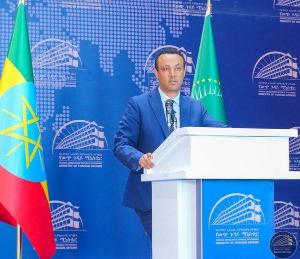
.jpg)
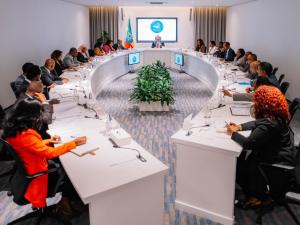
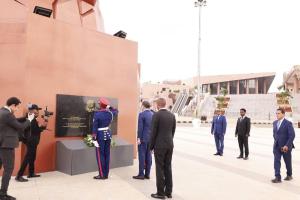
.jpg)
.jpg)
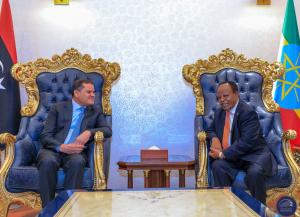
.jpg)


